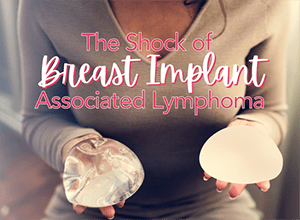
In 2011, the Food and Drug Administration (FDA) first identified a possible association between breast implants and a specific, rare type of lymphoma, an entity that would come to named “Breast Implant Associated Anaplastic Large Cell Lymphoma (BIA-ALCL).1 For breast cancer survivors who chose implant-based breast reconstruction as part of their cancer recovery, this is particularly jarring — the idea that a surgery they choose to recover from cancer could cause them to get a second cancer continues to shock and surprise many. The risk of BIA-ALCL seems most notable for patients who have textured implants. BIA-ALCL presents most often with swelling, pain, or mass in the area of the breast implant—often years after the implant was placed.2 A doctor evaluating the symptom will often find fluid around the implant. Treatment for BIA-ALCL, for those with the earliest stages of the lymphoma, can be as straightforward as removing the implant alone; but if there is evidence of lymph node involvement or invasion of the chest wall patients will require chemotherapy.2 Rarely, BIA-ALCL can spread outside the immediate area of the breast implant or lymph nodes and be life-threatening.
In 2018, the FDA recommended the types/brands of implants most associated with BIA-ALCL be removed from the market (“voluntary recall”), and that patients be informed if they had those types or brands previously implanted.1,3However, for those with the implants in place, the recommendation was not for removal, rather awareness, so that any changing symptoms would be noted and discussed early. For patients that develop BIA-ALCL, there are two reporting systems in place, MedWatch4 and the Patient Registry and Outcomes For Breast Implants And Anaplastic Large Cell Lymphoma Etiology and Epidemiology (PROFILE) Registry.5 There is also a National Breast Implant Registry6available regardless of type of implant or reason to have implant available through which investigators can collect real-world evidence about the potential side effects or risks of breast implants.
So how common is BIA-ALCL? As of 2020, the FDA reports 733 unique cases, which in lieu of the 20-30 million women with breast implants is rare. But when you look specifically at the implant most implicated and now voluntarily removed from the market, the Allergan BIOCELL implant, the 26-year incidence was 1 in 355 women with that implant developed BIA-ALCL.7
I recently talked to a Dr. Susan Love Foundation support who had both breast cancer and BIA-ALCL. She shared how shocked she had been by the diagnosis and how she wished we — health care professionals, the breast cancer community, and advocacy groups — kept talking about it so that no one else would be shocked. In 2020 when patients started to receive letters after the voluntary recall, I remember thinking that, based on moves over my lifetime, and my tendency to not open mail I think is junk, there is a good chance I never would have read a letter meant to tell me a medical device implanted in my body could cause me harm. (I do a better job opening my mail now!) I too would have been one of the shocked. So, this is blog is a gentle nudge to help prevent another person from being taken off-guard with a diagnosis of BIA-ALCL. Share it with a friend or on social media, tell someone that breast implants can be associated with lymphoma, or dig out your device card from your own breast implants and double-check the brand.
Wishing you all knowledge & health!
- https://www.fda.gov/medical-devices/breast-implants/questions-and-answers-about-breast-implant-associated-anaplastic-large-cell-lymphoma-bia-alcl
- Clemens MW, Jacobson E. Breast Implant-associated anaplastic large cell lymphoma. UpToDate Online October 26 2020. Accessed online August 5, 2022, at https://www.uptodate.com/contents/breast-implant-associated-anaplastic-large-cell-lymphoma#H184951769
- https://public4.pagefreezer.com/browse/FDA/16-06-2022T13:39/https://www.fda.gov/medical-devices/safety-communications/fda-requests-allergan-voluntarily-recall-natrelle-biocell-textured-breast-implants-and-tissue
- https://www.accessdata.fda.gov/scripts/medwatch/index.cfm?action=reporting.home
- https://www.thepsf.org/research/registries/profile
- https://www.thepsf.org/research/registries/nbir
- Cordeiro PG, Ghione P, Ni A, et al. Risk of breast implant associated anaplastic large cell lymphoma (BIA-ALCL) in a cohort of 3546 women prospectively followed long term after reconstruction with textured breast implants. J Plast Reconstr Aesthet Surg. 2020 May;73(5):841-846
